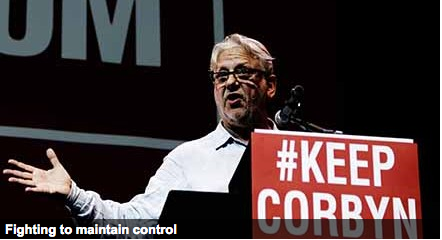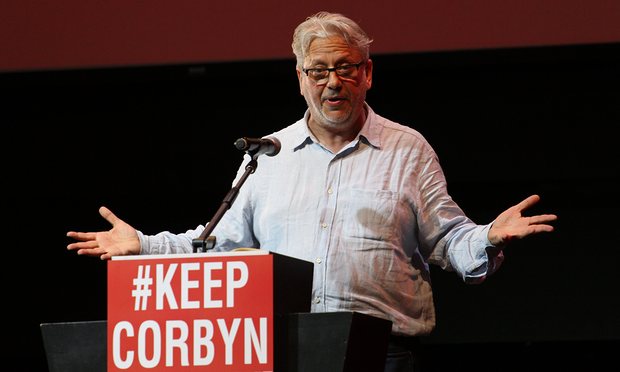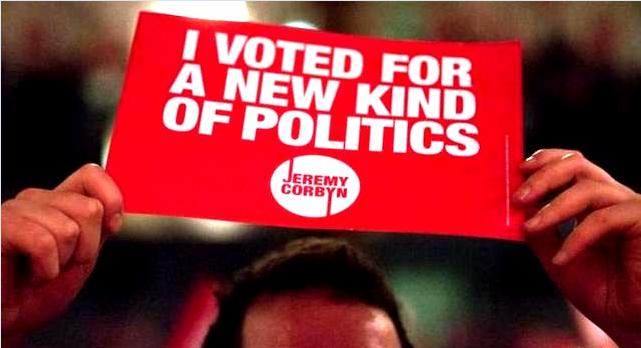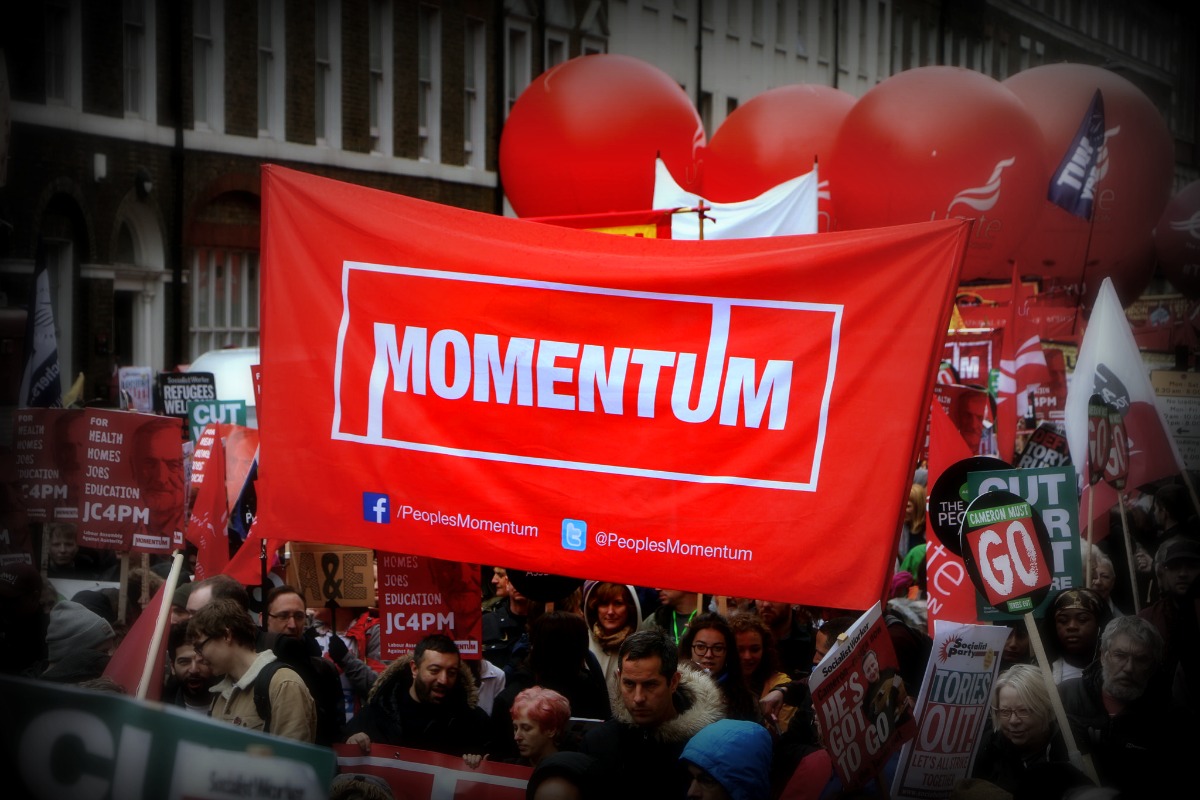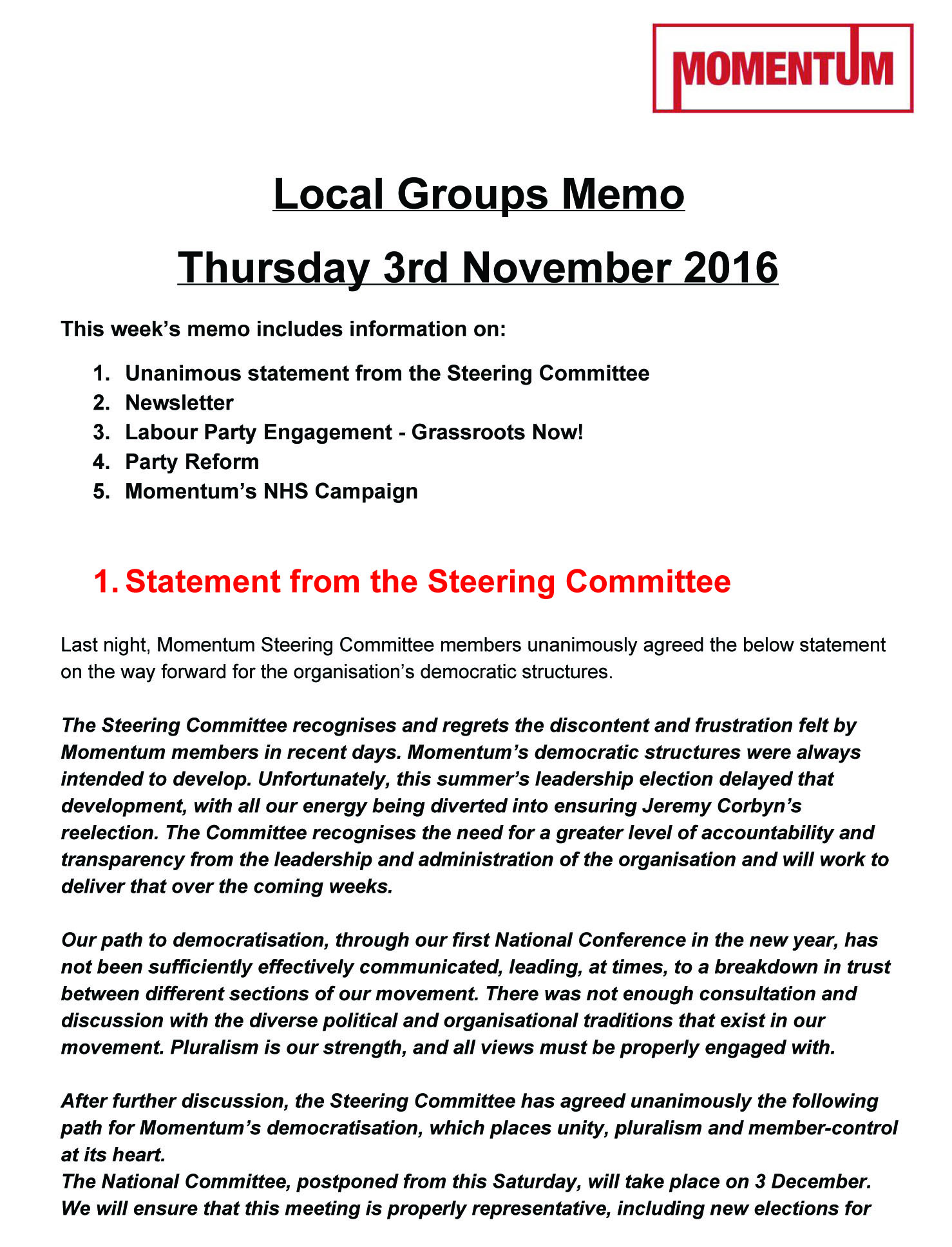The current Momentum crisis has nothing to do with age, Trotsky or even the voting method to be used at conference, says Carla Roberts of Labour Party Marxists. It is about who controls Momentum and for what political ends
You have got to hand it to Jon Lansman: he seems to have managed in record time to spread a totally fabricated ‘narrative’ about Momentum. Ever since comrade Lansman – the sole director of the company, Jeremy for Labour Ltd, which controls the database and the income of Momentum – lost the vote on the organisation’s national committee on December 3 he has been a busy getting the word out that, in fact, Tom Watson and the bourgeois media had it right all along: Momentum is riddled with Trotskyists and something needs to be done about it.
Of course, when Labour deputy leader Watson first published his ill-researched dossier on “proof of Trotskyist Labour infiltration” back in August, Lansman was quick to hit back: “That isn’t what Momentum meetings are like. The vast majority of people are entirely new to politics. In some areas, yes, you have some returners, but most of the returners aren’t Trots. This is not an entryist operation in any way.”1)www.newstatesman.com/politics/uk/2016/05/jon-lansman-interview-theres-no-leader-who-would-find-it-easier-win-jeremy
Well, either he was lying then or he is lying now.
How scary is the AWL?
In any case, in what is clearly a coordinated attack against the left in Momentum, Lansman has organised various ‘leftwing’ journalists and Labour apparatchiks to get out there into the mainstream media and warn the good people of Britain of the horrid “Trotskyist sectarians” and “saboteurs” who are organising a “takeover bid of Momentum”, as Owen Jones puts it in his particularly distasteful piece in The Guardian. The same Owen Jones, of course, who could not bring himself to support Jeremy Corbyn before and during this year’s attempt to remove him sparked by the Parliamentary Labour Party right wing.
In reality, there is only one side in Momentum that is organising any kind of coup or split. Jon Lansman and his allies are preparing the ground to overturn the decision of the national committee by undermining the NC’s legitimacy. In fact, they want to do away with this annoying body altogether.
“The sectarians” here are supposedly skilfully led by the few dozen members of the Alliance for Workers’ Liberty. As readers will know, we have little time for the AWL’s soft stance on imperialism or its attempt to paint any criticism of Zionism as anti-Semitic. In this respect its support for Lansman’s removal of Jackie Walker as vice-chair of Momentum has done much to help embolden his position.
But the AWL generally stands with the left majority in arguing for democracy in Momentum, while the pro-Lansman minority argues for a constitutional set-up that amounts to a one-man dictatorship. Despite its social imperialism, we defend the AWL against the witch-hunt in Momentum and the Labour Party.
And to claim that it is responsible for the fact that the NC majority voted on December 3 in favour of a delegate conference rather than online plebiscites (rather misleadingly summed up as ‘one member, one vote’ – Omov) is just absolute nonsense. The overestimation of the AWL’s influence stems largely from the fact that leading member Jill Mountford managed to get onto the steering committee, which was elected at the first meeting of the NC early last year (attendance at which was by invitation only). Its real influence can be gauged from the fact that the AWL’s November 26 ‘Stop the Purge’ conference attracted a mere 70 people.
But Owen Jones and his ilk would have us believe that the ‘old Trots’ are now a serious threat to Momentum. Apparently, there is an inter-generational war going on in Momentum, with most of the ‘old’ people firmly on the side of the evil Trotskyists. Jones, of course, takes the side of “their opponents”, who are “younger, idealistic, campaign-oriented and pluralistic, lacking Machiavellian strategic ability – all of which the sectarians exploit”.
Or, as the young(ish) Laura Murray – the oh-so-hip daughter of well-known Stalin admirer Andrew Murray – puts it, “When I arrived [at the NC] what I witnessed was horrible. The generational divide was starkly visible for all to see. In the seats in the horseshoe-shape around the room were the pro-Omov delegates – more likely to be younger, in the Labour Party and close to Momentum staff and Jon Lansman. In the seats in the centre of the room were the anti-Omov delegates – more likely to be older, Trotskyist, seasoned in far-left factions, not in the Labour Party. It was like a doughnut of desire for change, with a sticky centre of angry socialist stalwarts.”
A doughnut of desire … with a big brown filling of utter horseshit.
A number of ‘young’ NC delegates have, by the way, since criticised this attempt to spin real political divisions into a question of age (and have stated that they did, in fact, vote against systematic online plebiscites). Considering “the recent coverage”, one could be “forgiven for thinking the divide was between a Trotskyist old guard, who can’t countenance new ways of working, and hip youngsters who are filled with idealism and better at memes”, as Red Labour delegate Rida Vaquas puts it in her amusing article in the New Statesman.
Owen and Murray might look under 30 years of age – he, is, in fact, 32, and she is 27 – but they undoubtedly have far, far more political experience than most Momentum members, young or old. These members, let us remember, had mandated all their regional representatives at the NC to vote in favour of a delegate structure at the forthcoming Momentum conference – and against Omov. Those members active in Momentum branches have no interest in Momentum being controlled by one person. They want democracy and transparency. Unfortunately, however, many of them feel so sidelined and powerless that they mistakenly believe that Omov would give them at least some power. This is the alienated layer that Lansman is appealing to. But most of those actually running the branches, organising stalls and demonstrations, etc, know what is happening and have backed a delegate conference precisely for that reason.
It was mainly those delegates who had won the hastily called elections for supporters of “liberation groups”, together with those from Labour organisations personally invited by Lansman, who ensured that his view was not utterly trashed, but was supported by almost half the meeting.
But Jones, Murray and Lansman will not let this rather inconvenient fact get in the way of a good story. Or even their own experience – they should know better. Owen Jones likes to trace his family’s radical roots back to a “gunrunner for Garibaldi”, through to a “Russian Revolution-inspired” train driver who took part in the 1926 General Strike, a grandfather who joined the Communist Party in the 1930s, and a great-uncle in the Independent Labour Party. He himself was literally a child of the Militant Tendency in the Labour Party, where his parents met in the 1960s. Unfortunately, he is now busily in the process of betraying that heritage.
Keeping up with the Murrays
Murray, on the other hand, can look back at a very active, proud Stalinist family history. The story goes that, back in 1983, her parents wheeled their baby, Laura’s sister Jessica, into the 38th Congress of the ‘official’ CPGB and had her pram searched by Eurocommunist stewards – who found copies of Straight Left’s banned publication Congress Truth tucked away underneath her. Talk about a proper faction fight! Seamus Milne was business editor of Straight Left at the time and remains a close family friend of the Murrays.
But we are supposed to believe that the now almost grown-up Laura (did we mention that she’s really young?), who is an official advisor to shadow cabinet member Grahame Morris MP, had no idea that things might get a bit heated at the national committee. Come off it.
Her faux naive style has been further discredited by the fact that her dad, Unite’s chief of staff Andrew Murray, has just left the Morning Star’s Communist Party of Britain in order to join the Labour Party. Not that he is accused of being a communist ‘entryist’ by the right, of course – after all, there is talk of him being wheeled in to help sort out Momentum. In the run-up to Corbyn’s re-election last summer, Murray was among those who went along to a summit at a Unite training centre,2)www.politicshome.com/news/uk/political-parties/labour-party/news/79087/excl-tom-watson-tells-plotters-trying-oust-him which was also attended by Corbyn, John McDonnell, Len McCluskey, Diane Abbott, Seamus Milne and Jon Lansman. Apparently, it discussed, among other things, the possibility of Murray eventually replacing the hated Iain McNicol as Labour Party general secretary.3)www.spectator.co.uk/2016/09/from-left-to-left-a-whos-who-of-corbyns-comrades
Murray does not even have to bend his politics very much. Yes, he will have to cut back on his well-known admiration for a certain 20th century Georgian, but in terms of its political outlook, the CPB is no more revolutionary than even the Labour Party under Ed Miliband was. In the run-up to the 2015 general election, The Daily Telegraph published extracts from both parties’ programmes and asked its readers: “Can you tell them apart?” Slightly exaggerated, you might think. But it does underline the CPB’s lack of coherent strategy in terms of actually trying to transform the Labour Party (rather than just supporting it).4)http://weeklyworker.co.uk/worker/1056/no-strategy-towards-labour/ And, of course, Andrew Murray is among the large number of CPB members to have deserted it in favour of Labour since Corbyn’s election as leader.
Just like Paul Mason, Murray senior clearly feels that the current situation in Momentum is reason enough to jump on board. Not despite the struggles within the organisation, as Mason dishonestly claims, but precisely because of them – in order to come down heavily and with some authority on the side of Jon Lansman.
Paul Mason
Paul Mason, a member of the semi-orthodox Trotskyist organisation, Workers Power, for close to 20 years,5)http://labourpartymarxists.org.uk/paul-masons-consensus-democracy-same-old-ephemeral-new is now acting as turncoat par excellence. He has reinvented himself as a critic of Corbyn from the right, arguing in favour of keeping Trident, investing in nuclear power and increasing the arms budget.
On the BBC’s Daily Politics show on December 8, he said that Laura Murray was “broadly right” to describe Trotskyist groups as being “destructive” in Momentum, though some might question his expertise after he admitted that he had, in fact, “never been to a Momentum meeting”. Still, he is absolutely certain that “we need to be a network – open, broad, diverse”; and that “having an app on your cellphone” is really useful in terms of members making decisions. Definitely young at heart, this one. He even uses the American term for, you know, a mobile phone.
This magical app “would avoid re-enactment groups from the 1970s taking over, because that’s their key skill. There are not just Trotskyists though: they are people who are obsessed with anti-Zionism.” And, would you believe, “Some of them are rampant supporters of Vladimir Putin.”
Mason then went on to land his (and Lansman’s) killer punch. He basically demands that all those expelled or even suspended from the Labour Party should also be given the boot by Momentum:
Momentum has to be ready to become an affiliated society of Labour. That means everybody in it has to be in the Labour Party and everybody has to conform to the rules. And if somebody breaks Labour rules, as Jackie Watson [he meant Walker] is deemed to have done and who has been suspended from the party, then she can’t be …
At this point, he was interrupted by presenter Andrew Neil, but I suspect he was going to say ‘in Momentum’. He did state, for example:
If Jill Mountford is not allowed into the Labour Party – and I can’t see her being allowed in the short order in the Labour Party – and she remains an expelled member of the party and remains in Momentum, I will not remain in Momentum and nor will thousands of us. This will be sorted in the direction of party loyalty, discipline and a moving on very quickly.
You could be forgiven for thinking from especially this last sentence that Mason knows more than the average Momentum member (even those who do attend meetings) what Lansman is planning next. As it happens, he was also at the gathering with Corbyn and Lansman I referred to earlier, along with Andrew Murray. Surely, an official job in the Labour machine is the next step in Mason’s career.
Aside from implying that Momentum should not even differentiate between those expelled and suspended from Labour, he is also wrong to state that all members of a Labour-affiliated society have to be individual members of the party. This is clearly not the case: members of such societies are entitled to become “affiliated members” of Labour, who enjoy fewer rights than full members.6)“Affiliation means that the socialist societies – like a number of British trade unions – pay an affiliation fee to the Labour Party, and the affiliates’ members become affiliated members of the Labour Party (a different status from full member), unless they specifically choose otherwise. In return the societies receive a formal role in Labour decision-making, and the affiliated members can take part in all-member ballots in certain circumstances. For example, they can participate in the election of Labour Party leaders and deputy leaders, have delegates and votes at Annual Conference”: https://en.wikipedia.org/wiki/Socialist_society_(Labour_Party)
As an aside, Mason slipped up rather badly when trying to correct the other participant in the Daily politics discussion, Labour First honcho Luke Akehurst, who referred to “Workers Power, which Paul was a member of”. Mason replied, “No, no – that is now Red Labour.”
Mason’s ex-comrades in WP are now organising under the banner, Red Flag. Red Labour, on the other hand, is the soft-left online outfit of Momentum’s former social media manager, Ben Sellers.
Ben Sellers
Interestingly, Sellers is one of the few people close to Lansman who has now come out publicly against him. In a much-read and commented-on post on Facebook, he writes:
Could the real Jon Lansman please stand up? … Is it the Jon Lansman who only wants a “pluralistic”, democratic, grassroots organisation, facilitated by a new era of digital democracy? Or the Jon Lansman who told me to my face just a year ago that Momentum groups should be banned from having social media accounts and encouraged a completely unaccountable ‘helper’ to take over regional Facebook pages from local Momentum activists?
Lansman and Sellers fell out some time ago, it seems, and he continues;
I didn’t want to have to do this, and I think 12 months plus of silence on the issue is a sign of that, but Jon continues to use the press to push a version of events and an approach that I believe is harmful to the whole Corbyn movement and the Labour left, not just Momentum. What am I supposed to do? Sit on my hands while everything we’ve built gets taken apart?
The obvious reply to this is: ‘Why didn’t you comment in public 12 months ago, when the rot first set in and you still had a position of influence in Momentum that could have helped steer the ship in a different, more democratic, direction?’ Surely, openness is the most powerful weapon when confronted with a wannabe-dictator like Lansman. In any case, Sellers is making up for lost time now by spilling the beans on Lansman’s anti-democratic crusade in Momentum. Better late than never.
And it is certainly a more honest and fruitful method than the incredibly naive online petition being circulated by Chris Ford (ex-member of a many far-left organisations), which calls on everybody to just stop fighting and “work together”. Easy. It states: “We consider Momentum a dynamic plurality of ideas that demands respect for each other in the spirit of the New Politics.” The New Politics? What exactly is that? Something like New Labour, but better?
It then calls on those who were among the small leftwing majority at the December 3 NC meeting to recant the decisions taken – in order to push for an unworkable hybrid of Omov and delegate voting:
We believe the manner that digital and delegate democracy is being counterposed is unnecessary. We call upon the delegates to the national committee to put past disagreements behind them and secure a consensus which combines both methods of working to complement one another and thus strengthen opportunities for democratic engagement.
Not about voting method
This petition misses the point spectacularly. As if the current anti-left drive in Momentum is about the voting methods used at national conference. It is about who controls Momentum – and for what political ends. If a delegate conference ensured that Lansman and his allies continued to make up the majority on the new steering committee, there is no doubt he would go for it. They are pushing for Omov, because it is the only way to make sure the organisation stays in the hands of ‘Team Momentum’.
This team consists, of course, of the staff employed and controlled by Jon Lansman. He is, in effect, their direct boss. He decides how the database is used (basically, it is his personal property) and how the dues of the members are spent. Not a penny finds its way back to the branches; every email a branch sends has to be okayed by ‘Team Momentum’. There is no transparency at the top of Momentum at all.
Of course, we are not claiming that Jon Lansman has set out on this course in order to enrich himself or because he is suffering from a particular bad Bonapartist character flaw. Clearly, he is acting on behalf of Jeremy Corbyn and John McDonnell.
The current crisis in Momentum underlines the fact that Corbyn’s election was a historical accident, rather than a result of the power and strength of the Labour left. Most districts, regions and councillors – in other words, the Labour machine – are all very firmly in the hands of the right. The Labour left (Corbyn and McDonnell included) is disorganised and has no coherent strategy of how to transform Labour into an organisation that could fight for a socialist society. They also have no idea what to do with Momentum.
They no doubt appreciate that there is a database of 160,000 Corbyn supporters, some of who can be called upon to operate phone banks or hand out leaflets for this or that Labour campaign. But what Corbyn and McDonnell do not want is a strong, coherent organisation that starts to challenge the current (and temporary) ‘peace settlement’ with the right.
Witness Momentum’s silence on the purges in the Labour Party. Or the way in which the basic democratic demand for mandatory selection of MPs – until recently the standard position of the left and the Campaign for Labour Party Democracy – has been quietly dropped and is now seen as a major embarrassment.
Or the outrageous way in which the organisation not just went along with the entirely fabricated anti-Semitism ‘scandal’ in the Labour Party, but helped to facilitate it by throwing Jackie Walker to the wolves. Clearly, the longstanding Zionist, Jon Lansman, is seeking a rapprochement with the Jewish Labour Movement. Thanks to Corbyn’s and therefore Momentum’s stance on this matter, it is now ‘common knowledge’ that the Labour Party is ‘riddled with anti-Semites’: Theresa May has been handed the moral high ground on the question and no self-respecting member of the establishment objects, when she says the Labour Party is “disgusting” for “turning a blind eye to anti-Semitism”.7)http://www.telegraph.co.uk/news/2016/12/12/jeremy-corbyn-turning-blind-eye-anti-semitism-party-theresa/
Of course, in reality there can be no permanent peace between the left and right in the Labour Party. After Corbyn’s thumping second victory, the open warfare conducted by the right has merely been suspended for the time being – we are in a ‘pre-election period’, after all. But Corbyn is on borrowed time and he should know it. The next attempted coup will come soon enough, for the right will never accept him. Either he gets rid of them or they will get rid of him. The latter seems more likely, unfortunately.
Rather than using this fluid political period to openly fight to transform the Labour Party into a real party of labour, Corbyn and his allies are peddling the utterly deluded line that we must all ‘unite’ in order to secure a Labour victory at the next general election. And in their view, the only way that could happen is by bowing to the right – on Trident, Brexit, immigration: you name it. Of course, that does not make the Labour Party an ounce more ‘electable’. It just makes Corbyn look like a weak and rather dishonest leader who does not believe in his own vision of socialism.
The left in Momentum must be careful not to step into the ‘unity’ trap. This is a crucial moment for the Labour left. We must oppose the red scare in Momentum – and develop a plan to ensure that policy-making and control of the database and income is firmly in the hands of a democratically elected national committee – before Jon Lansman goes for the nuclear option.
References

